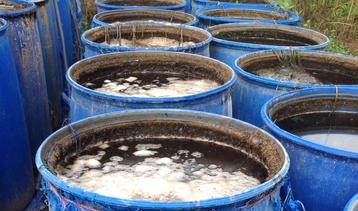Fermentation and Oudh

In our last blog post we spoke about soaking, just to recap soaking should be a hygienic, clean and effective process that simply aids in the breakdown of the wood and resin structures to help release deeper oils that otherwise would not be released. It is in fact hard work to maintain the requirements of acceptable soaking, the temperature has to be monitored, regular inspection of the waters smell, color and taste to ensure that there isn’t fermentation taking place.
Fermentation
When fermenting the microbial growth does impact the scent. I do not consider soaking and fermentation as the same, and this is where the distinction has to be made. Fermentation is a deliberate process that some distillers employ, generally distillers who distill for volume and do not distill to create art, will do what they can to hit a new production target and fermentation aids in that process, as it manipulates the scent of cheaper oils.
Production
Fermentation has become common practice due to the high demand in the world for oudh oils. Distillers have become so fine tuned with their fermentation methods that they could just about use white oudh wood and give it a ‘oudhy’ profile. There are two reasons for this; firstly the classic Hindi oudhs, freshly distilled did have a barn scent profile, to some degree the distillers are trying to mimic that profile as the traditional middle eastern market valued the hindi and cambodi oils. The second reason is, in fermentation the microbial growth does assist the distillers to turn an oil that would smell like vegetable oil to one that smells like ‘oudh’, be it very bad quality oudh. Some even argue that they are copying the fungal production of nature herself through employing fermentation.
Not to forget all of this adds to the output, the factories no longer have to be fussy about high grade wood, they just throw what they can get their hands on into the grinder, dump it in microbial saturated tanks that they have been using for months if not years. They start with 3 month fermentation process, 6 months, and even 12 months, depending on how feral and skunky the client likes the oudh to smell.
Demand
Whilst this process is not one that artisan’s would entertain, these distillers do have a method to their madness. Their distillation setups are unique to their own as is the airing, resting and storage setups. In volume what these guys turn around floors all artisan’s put together, so there is clearly a demand for their oils.